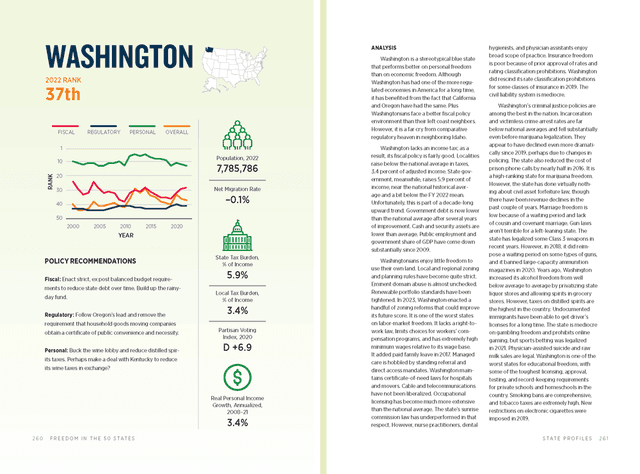Policy Recommendations
- Fiscal Enact strict, ex post balanced budget requirements to reduce state debt over time. Build up the rainy-day fund.
- Regulatory Follow Oregon’s lead and remove the requirement that household goods moving companies obtain a certificate of public convenience and necessity.
- Personal Buck the wine lobby and reduce distilled spirits taxes. Perhaps make a deal with Kentucky to reduce its wine taxes in exchange?
Analysis
Washington is a stereotypical blue state that performs better on personal freedom than on economic freedom. Although Washington has had one of the more regulated economies in America for a long time, it has benefited from the fact that California and Oregon have had the same. Plus Washingtonians face a better fiscal policy environment than their left coast neighbors. However, it is a far cry from comparative regulatory heaven in neighboring Idaho.
Washington lacks an income tax; as a result, its fiscal policy is fairly good. Localities raise below the national average in taxes, 3.4 percent of adjusted income. State government, meanwhile, raises 5.9 percent of income, near the national historical average and a bit below the FY 2022 mean. Unfortunately, this is part of a decade-long upward trend. Government debt is now lower than the national average after several years of improvement. Cash and security assets are lower than average. Public employment and government share of GDP have come down substantially since 2009.
Washingtonians enjoy little freedom to use their own land. Local and regional zoning and planning rules have become quite strict. Eminent domain abuse is almost unchecked. Renewable portfolio standards have been tightened. In 2023, Washington enacted a handful of zoning reforms that could improve its future score. It is one of the worst states on labor-market freedom. It lacks a right-to-work law, limits choices for workers’ compensation programs, and has extremely high minimum wages relative to its wage base. It added paid family leave in 2017. Managed care is hobbled by standing referral and direct access mandates. Washington maintains certificate-of-need laws for hospitals and movers. Cable and telecommunications have not been liberalized. Occupational licensing has become much more extensive than the national average. The state’s sunrise commission law has underperformed in that respect. However, nurse practitioners, dental hygienists, and physician assistants enjoy broad scope of practice. Insurance freedom is poor because of prior approval of rates and rating classification prohibitions. Washington did rescind its rate classification prohibitions for some classes of insurance in 2019. The civil liability system is mediocre.
Washington’s criminal justice policies are among the best in the nation. Incarceration and victimless crime arrest rates are far below national averages and fell substantially even before marijuana legalization. They appear to have declined even more dramatically since 2019, perhaps due to changes in policing. The state also reduced the cost of prison phone calls by nearly half in 2016. It is a high-ranking state for marijuana freedom. However, the state has done virtually nothing about civil asset forfeiture law, though there have been revenue declines in the past couple of years. Marriage freedom is low because of a waiting period and lack of cousin and covenant marriage. Gun laws aren’t terrible for a left-leaning state. The state has legalized some Class 3 weapons in recent years. However, in 2018, it did reimpose a waiting period on some types of guns, and it banned large-capacity ammunition magazines in 2020. Years ago, Washington increased its alcohol freedom from well below average to average by privatizing state liquor stores and allowing spirits in grocery stores. However, taxes on distilled spirits are the highest in the country. Undocumented immigrants have been able to get driver’s licenses for a long time. The state is mediocre on gambling freedom and prohibits online gaming, but sports betting was legalized in 2021. Physician-assisted suicide and raw milk sales are legal. Washington is one of the worst states for educational freedom, with some of the toughest licensing, approval, testing, and record-keeping requirements for private schools and homeschools in the country. Smoking bans are comprehensive, and tobacco taxes are extremely high. New restrictions on electronic cigarettes were imposed in 2019.

